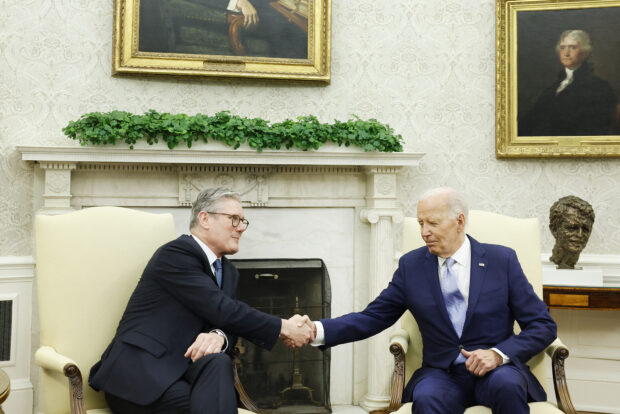Biden hails ‘best of allies’ in first talks with UK’s Starmer

WASHINGTON, DC – JULY 10: U.S. President Joe Biden (R) and British Prime Minister Keir Starmer (L) shake hands while speaking to reporters before a bilateral meeting in the Oval Office of the White House on July 10, 2024 in Washington, DC. Starmer is visiting the United States to participate in the 2024 NATO summit. (Getty Images via AFP)
WASHINGTON – New British Prime Minister Keir Starmer met President Joe Biden at the White House for the first time Wednesday with the US leader hailing Britain as a key ally on global issues including the war in Ukraine.
“We’re the best of allies in the whole world,” the 81-year-old Biden said as he shook hands with his fellow center-left leader in the Oval Office.
Biden added that he saw Britain as the “knot tying the transatlantic alliance together.”
Starmer, 61, also making his debut at a NATO summit in Washington less than a week after winning elections, said that “this special relationship is so important” and that it’s “stronger than ever now.”
The two men also joked about the English football team’s semi-final win in the Euro 2024 championships, saying their victory over the Netherlands was “all because of the prime minister.”
Article continues after this advertisementNeither man however addressed the elephant in the room, with Biden’s reelection chances mired in crisis since a disastrous debate performance against Donald Trump.
Article continues after this advertisementThe growing questions over Biden’s health have also raised fears among allies about a second term for Trump, who has openly questioned NATO’s usefulness and mused about cutting a quick deal with Russia on Ukraine.
In Washington, Starmer promised to keep up Britain’s steadfast support for Kyiv and gave his blessing for strikes inside Russia with British missiles.
Days after his Labor Party swept elections and threw out the Conservatives in power for 14 years, Starmer said he had a “very good” meeting with Ukrainian President Volodymyr Zelensky on the sidelines of NATO’s 75th anniversary summit.
“I made it absolutely clear that as far as the UK is concerned, the change of government makes no difference to the support that we will provide,” Starmer told reporters.
On his flight to Washington, Starmer said British-supplied Storm Shadow missiles were for “defensive purposes,” but it was up to Ukraine to decide how to deploy them — effectively giving Kyiv the green light for strikes inside Russia.
‘As long as it takes’
Starmer was to say in a speech to NATO leaders on Thursday that Britain will stand with Ukraine “for as long as it takes.”
He was also to recommit to £3 billion ($3.9 billion) a year of military support for Ukraine until 2030-31, the British government said.
Britain will also deliver a new package of artillery and 90 Brimstone missiles in the coming weeks and contribute to a huge NATO assistance package for Kyiv.
Britain under three Conservative prime ministers has been among the staunchest supporters of Ukraine in the war, taking the lead in pushing for more advanced military systems and looser restrictions on Kyiv.
Biden, who has strongly backed Ukraine but has been careful not to start a direct conflict with Russia, recently made a similar move by letting Ukraine strike Russian offensive positions just across the border with US weapons.
Zelensky hailed the decision on the Storm Shadow missiles, writing on Telegram, “Thank you for your continued support of Ukraine and our people!”
Kremlin spokesman Dmitry Peskov warned that Russia will take “appropriate measures” in response to Starmer’s decision.
Starmer spoke with other Western leaders at the NATO summit including French President Emmanuel Macron.
Starmer said he hoped the NATO summit would send a message to Russian President Vladimir Putin that the alliance is “bigger now than it’s ever been, more united than it’s ever been, and absolutely clear-eyed about the threat of Russian aggression.”
A NATO summit in Britain in 2014 set a goal of each ally contributing at least two percent of GDP to defense, a long-running demand of the United States.
Only the United States, Britain and Greece then met the target, but since the invasion of Ukraine the number has gone up to 23 members of the 32-nation alliance.
Britain’s new defense secretary, John Healey, called for NATO to consider moving toward a 2.5 percent goal.
The growing threats around the world suggest that “all NATO nations are going to need to do more than simply two percent,” Healey told reporters.